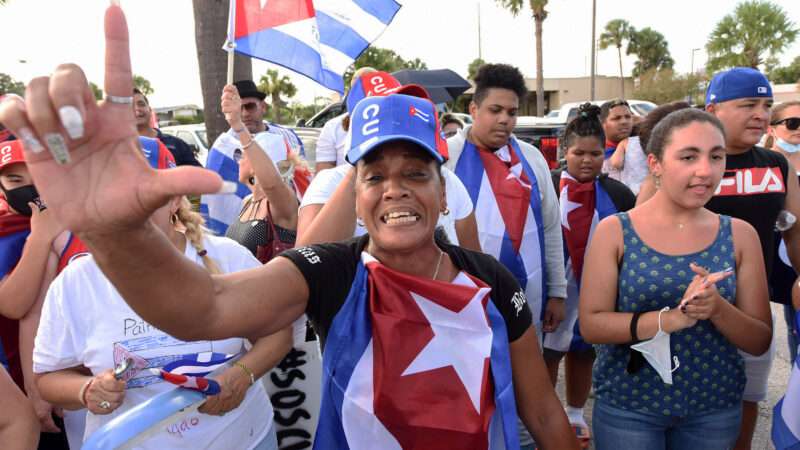
One year has passed since pro-democracy protests broke out across Cuba, representing the largest popular protest against the island's communist government since Fidel Castro came to power in 1959.
Frustrated by the worst economic downturn since the end of the Cold War, the government's continued repression of artists, musicians, and dissidents, and persistent power outages, protesters took to the streets in the city of San Antonio de los Baños on July 11, 2021. Videos of the protests went viral on Cuban social media, inspiring weeks of revolt against the Cuban government across the island. Unlike previous upheavals, like the infamous 1994 Maleconazo protests that took place in Havana, these protests spread beyond Cuba's main cities and into small towns.
While the Cuban government at the time blamed U.S. sanctions for the state of the Cuban economy and claimed the protests were part of a targeted campaign by the U.S. and other Western actors, protesters squarely placed the blame for the country's state of affairs on government officials, focusing particular ire toward President Miguel Díaz-Canel with vulgar chants. This prompted massive repression by state security forces, who cut internet service across the island and arrested thousands of protesters, including minors, in successive days. Over 700 people remain in custody, according to exile groups.
Ahead of the anniversary, political prisoners, including Luis Manuel Otero Alcántara, one of the most well-known members of the Movimiento San Isidro, a group of dissident artists and musicians on the island, announced they would launch a hunger strike while behind bars. Several high-profile dissidents, among them Angel Moya Acosta, husband of Ladies in White founder Berta Soler, were also arrested in the days leading up to the anniversary out of fears they would organize new protests.
Cuban state media has largely reacted to the anniversary with scorn. In a speech in Bauta, Díaz-Canel termed the protests as "unpleasant events" and focused on the "revolution's defenders," portraying the event as a triumph for the revolution. Granma, the Cuban Communist Party's official newspaper, similarly called July 11 a day of "overwhelming victory."
Across the Florida Straits, exile groups and Cuban-American politicians have reacted very differently to the anniversary.
"Afro-Cuban artists ignited a movement that inspired everyday Cubans of all ages to stand up in condemnation of decades of repression, censorship, indoctrination, and human rights abuses," Sen. Marco Rubio (R–Fla.) said in a press release.
Though the communist regime remains in place despite the popular uprising, many Cuban-American politicians have voiced not only their continued support for the protesters but also a firm belief that they marked a turning point in the fight against the Cuban dictatorship.
"The spirit of July 11th lives on today as a sign that after all these years the fall of the Raul Castro/Díaz-Canel regime is closer than ever," Rep. Maria Elvira Salazar (R–Fla.), who represents South Florida's Little Havana neighborhood, said in a statement to Reason. "The bravery of the Cuban people will endure as they fight against communist oppression."
For exile groups, the anniversary also underscores how little things have changed in Cuba since then. "The causes of July 11th remain," Omar Lopez Montenegro, Human Rights Director at the Cuban American National Foundation (CANF), told Reason over the phone. "In fact, things have gotten worse. The economic situation, the political situation, they've all gotten worse."
Though the end of the pandemic has revived Cuba's critical tourism sector and the government has implemented some liberalizing reforms, Cuba is still mired in shortages and rapidly rising prices. The government has also continued its harassment of dissidents and journalists, doubling down on its human rights violations. This has driven record migration from the island; as The Miami Herald reports, the Coast Guard has intercepted 3,000 Cuban migrants by sea since October of this year, more than it intercepted over the previous five years combined.
Going forward, CANF and other exile groups see their role unchanged. For them, their key work is supporting activist and dissident groups that emerge on the island financially and politically. They also see their work as an amplifier of news and first-hand accounts of regime repression as especially vital in light of the growing resonance of social media on the island.
Many lawmakers remain undeterred in their efforts to empower dissidents and hold the Cuban government accountable. Rubio has pointed to his "Patria y Vida Act," named after the reggaeton song that has become an anthem for the island's pro-democracy movement. As Rubio wrote in a recent op-ed for ADN America, his bill "would provide resources to U.S. companies to help Cubans bypass internet censorship and develop a strategy to overcome regime-led blackouts on the island and beyond."
For all of them though, the anniversary matters less than the bigger work left in the fight against the Cuban dictatorship.
"It's not about a specific date," Lopez Montenegro said. "It's about the struggle of a people."
The post Cuban Exiles, Lawmakers Commemorate Anniversary of July 11 Protests appeared first on Reason.com.







